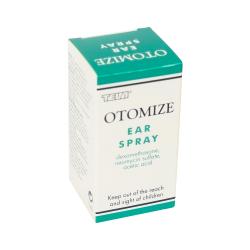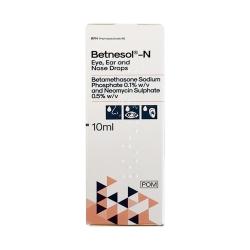Login to your account
- Private & confidential service
- Genuine medication
- All-inclusive service - No hidden fees
- Next day delivery
- Ear Infections
Ear Infections: start your consultation
- 1. Answer the online medical questions
- This helps our doctors to decide which treatment is safe for you
- 2. Select your treatment
- You will see a list of recommended treatments. You can select the one you prefer.
- 3. Checkout and delivery
- Once you’ve completed the checkout, our doctors will review your answers. If all is safe, you will receive your treatment tomorrow.

- Triple-action
- Eases swelling and inflammation
- Fights underlying cause

- Easy application
- Reduces inflammation
- Antibiotic effect
Ear Infections
Ear infections are bacterial, fungal or viral infections that are localised to the outer or inner ear canals. They are easily identified by painful or itching sensations - infections are the most common cause of earache.
Read more below about how to prevent infections and discover treatments available from HealthExpress.
Topics
What is an ear infection?
An ear infection is a very common condition, affecting around 1 in 10 adults at some point in their life.
The result of bacterial, fungal or viral infection, ear infections can also be mistaken for an allergic response or eczema.
Diabetes can also make you more susceptible to developing ear infections.
If you are unsure of the cause of your symptoms, you should consult a doctor.
The condition is divided into three categories that indicate the area of the ear affected:
- otitis externa - the outer ear
- otitis media - the middle ear
- otitis interna - the inner ear
HealthExpress provides treatment for the first of these categories, otitis externa. The best indicator of outer ear infections is the presence of pain when the ear is touched.

Fortunately, most ear infections are not a cause for serious concern and will resolve themselves naturally. However, treatment is recommended to speed up recovery.
What causes ear infections?
Inside your ears, you have canals called ‘eustachian tubes’. These canals lead to the back of your throat. They are split into three separate chambers; the inner, the middle and the outer.
As with all orifices on your body, germs can enter into these canals, resulting in infection. Germs can be bacterial, viral or fungal.
There are a number of factors that can increase the chance of infection. These include:
- swimming
- living in a hot or humid climate
- poor cleaning practices
- skin conditions (such as eczema)
- past infections
- being diabetic
- being asthmatic
- having allergic rhinitis
HealthExpress sells an antibacterial medication, Otomize, for outer ear infections, otherwise known as ‘otitis externa’ or ‘swimmer’s ear’. This is the section of your ear between the outside of the eardrum to the opening of the ear.
Otitis externa is most easily diagnosed by the presence of pain when the ears are touched or pulled. Infections of the middle and inner ear may present with different symptoms.

Other common symptoms of ear infections (including otitis externa) include:
- unusual sensations
- itching and irritation
- hearing issues
- discharge from the ear
It is important to be very careful when cleaning the ear, especially if there are visible signs of infection, such as discharge. It is very easy to exacerbate an infection if minor cuts and scrapes are made.
What are the symptoms of ear infections?
Some of these symptoms can also indicate other underlying conditions, such as allergies, which is why it is vital to be certain of a diagnosis before beginning treatment. You should consult a doctor if you are suffering from any of the above.
A doctor will perform an ear exam, using a special tool called an otoscope. This will allow them to examine the canal and eardrum. If there is any sign of infection, such as swelling or discharge, they should be able to see it here.
How can ear infections be treated?
Despite many infections being bacterial, antibiotics are not always prescribed, as the infection can clear up on its own.
For outer ear infections, you should first clean the ear (being careful not to cause any damage). Gently wash with a small amount of warm water, and dab dry with a clean cloth.
You can then apply antibacterial medication to the affected area. HealthExpress offers the spray Otomize, containing the active ingredients neomycin (an antibiotic) and dexamethasone (a steroid). It is easy to apply and effective at treating mild to moderate infections.
If there is no improvement after seven days, you should stop using the treatment, and contact your doctor. You may require a swab of the infection, oral antibiotics or a referral to a specialist ENT (ear, nose and throat) doctor.
If you have any boils developing in your ear, a GP or specialist may need to puncture it, to bring down the swelling. You should not do this yourself, instead consult a medical professional.
medical form
medication
prescription
from pharmacy

